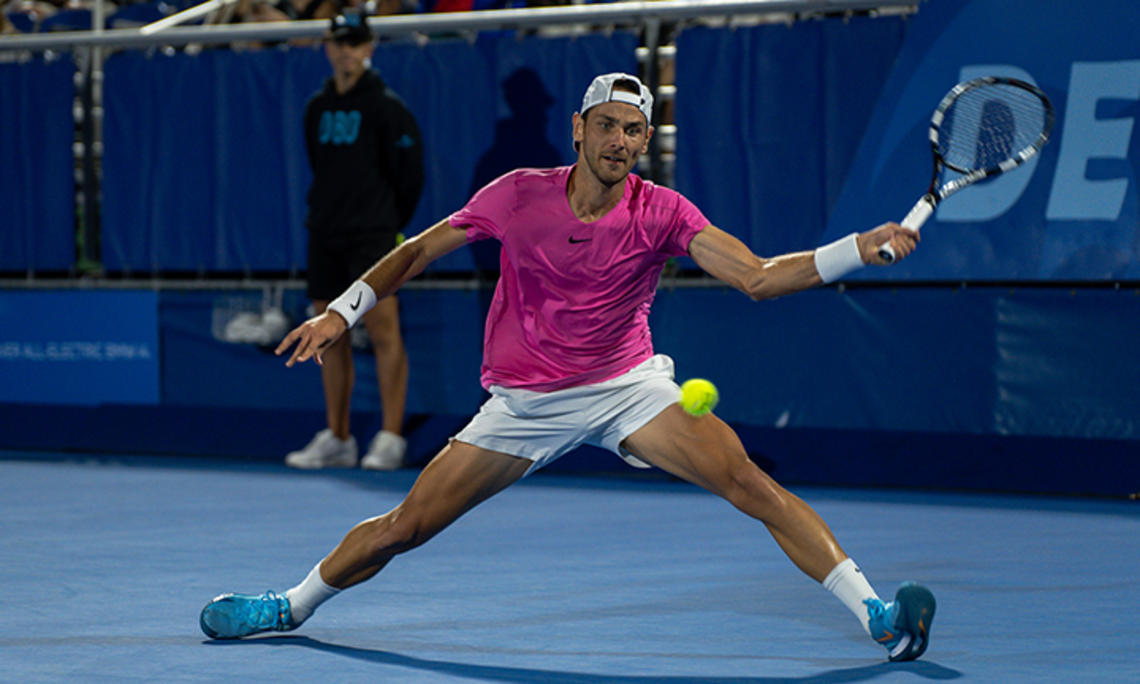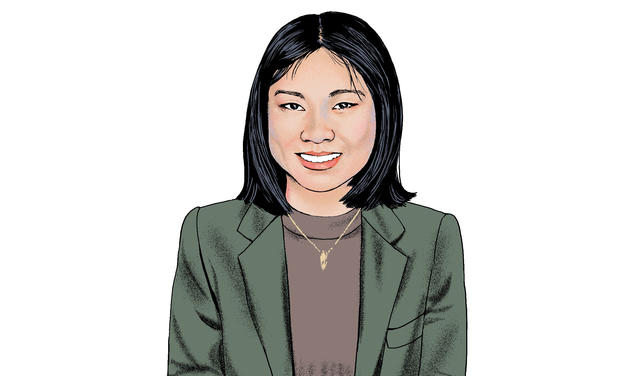Matija Pecotić ’13 Stunned the Tennis World with Tournament Upset
‘It seems like the tennis gods are speaking to me’

Not that long ago, Matija Pecotić ’13 thought his days as a professional tennis player were probably over. Once ranked 206 in the world, a lingering infection and then the pandemic had derailed his career, and Pecotić, 33, had largely moved on with his life, getting his MBA at Harvard and starting a full-time job with a real estate investment firm in West Palm Beach, Florida.
But he never entirely gave up on the dream, and when the ATP Tour came to Florida in early February, Pecotić snagged a spot in the qualifying rounds of the Delray Beach Open, winning both his matches.
And then, in the main draw of the tournament, against Jack Sock, formerly eighth in the world, Pecotić scored a magical upset.
As news of his victory pinged around the tennis world — part-time pro with full-time job beats former top-10 player — his phone lit up with messages of support. Even Novak Djokovic, his former hitting partner, congratulated him on Instagram: “You don’t belong in the office just yet.”
“Given the circumstances and the way my tennis career has played out, it’s probably one of my sweetest, most rewarding tennis experiences,” Pecotić says. And it’s inspired him to rejoin the tour: “If you believe in destiny, or getting a sign from above, it seems like the tennis gods are speaking to me.”
Pecotić arrived in Princeton in summer 2009 with his rackets, a suitcase, and little in the way of match experience. Born in Belgrade, he was raised in Malta, hardly an epicenter of tennis excellence. During his college search, he sent a video of himself playing to Princeton’s then-coach, Glenn Michibata, who says something caught his eye. When he finally saw Pecotić play on campus, Michibita realized Pecotić was driven.
“Right away you saw his commitment to try and get the most out of what he had,” Michibata recalls.
Pecotić, meanwhile, was focused on how good his teammates were, until Michibata sat him down for a chat. “If you listen to what I say, you can be one of the top players in the country. Not just in the league, but in the country,” Pecotić recalls his coach telling him. “Some guy who barely knew me had this belief that I didn’t have in myself, and that was the catalyst, that was the ignition for all the great things I went on to achieve at Princeton.”
Pecotić earned Ivy League Player of the Year honors three times and rose to number two in the collegiate rankings his senior year. After graduation, he joined the Futures Tour and embarked on the crushing grind of making it as a professional player. “It’s not easy and it’s not pretty,” he says, recalling his years chasing ranking points, his schedule a blur of far-away places: Egypt, Tunisia, Nigeria, Cambodia, Thailand.
A lefty with an aggressive all-court game, he served as a hitting partner for Djokovic during the 2013 U.S. Open. By age 26, he was poised to make a run at the top 100, until he developed a staph infection after a routine surgery for a sports hernia. He missed more than a year of competition and began thinking about his post-tennis future, enrolling at Harvard.
But then, a second act: A group of friends, players in Boston who also happened to be venture capitalists, encouraged him to stick with tennis and backed him financially. Pecotić returned to the court, winning tournaments in Lebanon and Thailand, among other places, and playing some of the best tennis in his life. Once again he appeared poised to break through. Once again the fates intervened, this time in the form of the pandemic. The tour stopped, his ranking was frozen, and he took a job as director of capital markets at Wexford Real Estate Investors.
How to explain his latest revival? He credits his 70-year-old boss at the firm, Joseph Jacobs, a man with the “discipline of an Olympic athlete,” who serves as an occasional hitting partner and inspired him to intensify his own training.
Even though he lost his next match in the Delray Beach Open, Pecotić rose to 572 in the world rankings. His victory over Sock resonated, he thinks, because it inspired others to rethink their own ambitions: Maybe I should be doing a little more with myself. Maybe I should pursue that dream that I cast aside. He’s heeding his own advice, with plans to play 25 tournaments this year, all while keeping his full-time job.
“The love of the game is still there and physically I don’t have a lot of mileage,” Pecotić says. “So I’m working out a way to keep this going for a little longer.”










0 Responses